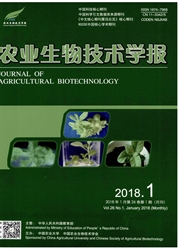

 中文摘要:
中文摘要:
线粒体融合蛋白2基因(mitofusin2,Mfn2)参与细胞凋亡和细胞周期调控,在卵母细胞和胎盘发育中起着重要作用.本研究旨在探讨Mfn2基因对小鼠(Mus musculus)卵母细胞体外成熟过程的影响.从小鼠卵巢中克隆Mfn2基因并构建pMfn2-Venus真核表达载体.经脂质体2000介导重组质粒pMfn2-Venus转染293T细胞(病毒包装细胞),确认重组质粒在293T细胞内的表达及定位.将pMfn2-Venus体外转录为cRNA,并注射入小鼠卵细胞中,进行体外成熟培养,并统计卵母细胞生发泡破裂(germinalvesiclebreakdown,GVBD)发生率以及第一极体(first polarbody,PB1)排出率,荧光显微镜下观察其表达及定位.结果显示,注射了Mfn2-Venus cRNA的卵母细胞,其GVBD发生率以及PB1排出率与对照组相比显著降低(P<0.0001,P<0.05).本研究首次揭示了Mfn2基因对小鼠卵母细胞体外成熟过程的影响,为卵母细胞体外成熟的研究提供了一个新方向,同时也为研究减数分裂过程中Mfn2基因提供了一个平台.
 英文摘要:
英文摘要:
Mitofusin 2(Mfn2) participates in apoptosis and cell cycle regulation, which also has an important role in oocyte and embryo development. In order to determine Mfn2 gene effect on mouse(Mus musculus) oocytes during in vitro maturation(IVM) in the present study, firstly, the Mfn2 gene was cloned from mouse ovary by RT-PCR, and an eukaryotic expression vector pMfn2-Venus was constructed, pMfn2-Venus was transfected into 293T cells(virus pakge cell) after mediation by Lipofectamine 2000, identified by fluorescence microscopy observation and Real-time PCR. Then, the cRNA of Mfn2-Venus transcriped in vitro was microinjected into mouse oocytes, and the expression and location was observed under fluorescence microscopy. Finally, the oocytes which were injected Mfn2-Venus cRNA were collected for mature cultivation and the rate of germinal vesicle break down(GVBD) and first polarbody(PB 1) were calculated, respectively. The results showed that the recombinant vector pMfn2-Venus was successfully constructed. After transfection or microinjection, the fusion protein could express efficiently and localize accurately both in 293T cells and mouse oocytes. This greatly facilitated the further study of Mfn2, especially its role on oocytes maturation and early embryo development. The rate of GVBD and PB1 were reduced significantly(P〈0.0001, P〈0.05) compared with the that of control group. In conclusion, these data demonstrated that Mfn2 gene had effect on mouse oocytes maturation, it provides a new direction in the research of in vitro maturation of oocytes and a platform for the study of the Mfn2 gene in the process of meiosis.
 同期刊论文项目
同期刊论文项目
 同项目期刊论文
同项目期刊论文
 期刊信息
期刊信息
